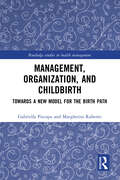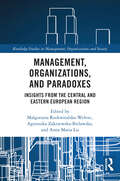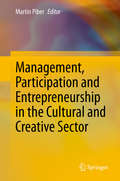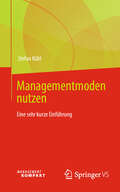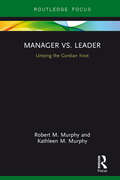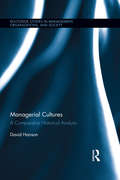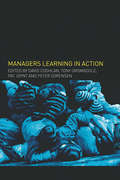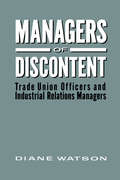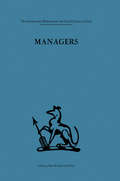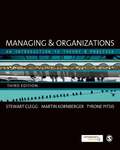- Table View
- List View
Management, Conflict Resolution and Strategy: Coping with Stress at Work (Routledge Studies in Management, Organizations and Society)
by Anna Wziątek-Staśko Magdalena KraczlaManagers are key people in building the success of any organization. Business results depend on their efficiency in the implementation of the power entrusted to them. This efficiency, on the other hand, largely depends on psychosocial competences and personality predispositions. One of the main factors affecting destructively on managers is stress, destroying the level of their motivation to work, the level of commitment and ultimately resulting in premature professional burnout and a significant reduction in the level of efficiency. Ultimately, instead of efficient and motivated specialists, companies are struggling with employees suffering from depression. Exploration of the issue of identifying the sources of stress draws attention to conflict as one of the main research categories that are closely related to the category of stress. It is worth emphasizing that this relationship is two-way: conflict determines the level of stress, stress may determine the scale of conflict situations. This recommended monograph provides the latest knowledge on what contemporary managers use conflict resolution styles and what strategies they choose to deal with in stressful situations. A particular advantage of the study is the presentation of the links between both research categories, which are so paramount nowadays.
Management, Organisation and Childbirth: Towards a New Model for the Birth Path (Routledge Studies in Health Management)
by Gabriella Piscopo Margherita RubertoManagement, Organization and Childbirth: Towards a New Model for the Birth Path explores the complex topic of the birth path with a multidisciplinary magnifying glass on the paradigms, languages, and tools critical to the organization, management, and clinical science. The work consists of five chapters. The first chapter provides a multidimensional analysis of childbirth. The second chapter presents an organizational analysis that moves in unison with different models of health. The third chapter studies the birth path in organizational and cynical terms by describing it in its core processes. The fourth chapter proposes a study conducted in the Italian context, which identifies some useful determinants for redesigning the birth path. The fifth chapter formulates a proposal for redesigning the birth path based on a new health paradigm. The proposed model offers useful insights for multiple categories of readers. To students of medicine and higher education tracks in healthcare management, it can offer opportunities to raise awareness not only regarding multi-professional practice but also regarding confrontation with complementary disciplines. To practitioners and policy makers, it can provide useful stimuli to promote rational and informed decisions around the childbirth. To researchers studying the health context within different disciplinary domains, the model can offer unexplored research spaces within the new business complex system.
Management, Organization and Fear: Causes, Consequences and Strategies (Routledge Studies in Management, Organizations and Society)
by Marek Bugdol Kazimierz Nagody-MrozowiczFear is a fundamental emotion, a process combining four elements: physiological arousal, subjective feelings, cognitive interpretation and behavioural expression. The notion of fear is related to such terms as apprehension, uncertainty, risk, anxiety, horror. Fear has always accompanied people. It is ubiquitous, but its level rises when people pursue tasks or objectives, are controlled or assessed. Hence, its strong presence in management processes. This book illustrates various types of fear, its sources and consequences, as well as reduction methods. The authors discuss notions related to fear (e.g. uncertainty, anxiety), the significance of fear and its roles from the points of view of business owners, employees, trade unions, and managers, as well as the roles of fear in various management concepts. They present various methods and tactics of employee intimidation including humiliation, false accusations, excessive control, blackmail, bullying, and harassment. The objective of Management, Organization and Fear: Causes, Consequences and Strategies to make the reader aware of economic and social benefits available if an organizational environment is free from fear. It aims to ensure that the reader knows how to reduce fear and how to defend against its negative consequences and will therefore be of value to researchers, academics, managers, and students in the fields of organizational studies, human resource management, work and organizational psychology, and sociology.
Management, Organizations and Contemporary Social Theory
by Stewart Clegg Miguel Pina CunhaSocial theorists speculate about large-scale social questions, asking of any phenomenon, how is it possible? This book addresses how various social theories contribute key insights into the nature of organizations and management. The cast of characters to be found in this book have had a transcendental impact, including on the practices of the management and organization disciplines. For students, however, engaging with social theory in a conversation that is much broader and potentially richer than those that may have been previously encountered is not at first easy. The question is where to begin: this book provides answers. Drawing on research from international contributors, this valuable textbook is an essential resource for students and introduces key social theories and theorists making them accessible to a management audience. The chapters include objectives and end-of-chapter reflective questions, as well as a glossary for readers grappling with new terms.
Management, Organizations, and Paradoxes: Insights from the Central and Eastern European Region (Routledge Studies in Management, Organizations and Society)
by Malgorzata Rozkwitalska-Welenc, Agnieszka Zakrzewska-Bielawska, and Anna Maria LisParadoxical tensions are persistently inevitable in today’s complex organizational world. Therefore, managers should perceive them as a lens through which they see organizations and work through them. Reconciling paradoxes requires understanding their nature and appraising them. It also involves novelty and creativity in implemented tactics. Thus, to help managers navigate dualities and contradictions in their organizations, Management, Organizations, and Paradoxes presents a comprehensive overview of implementing the paradox theory from a distinct organizational standpoint in the Central and Eastern European (CEE) context. Beyond theoretical foundations, it integrates recent research findings and practical insights, providing rich knowledge for managing conflicting demands across diverse organizational dimensions. In addition, it unlocks new insights that can enrich academic discourse and guide practitioners in embracing a paradox mindset. It develops less-explored areas, such as paradox regarding sustainability in clusters, or digital and energy transition. It also explores paradox in human resource management, workplace learning, diversity, equity, and inclusion policy. It tests whether paradoxes have regional variation and provides insight from managerial practices in CEE. The authors prove that organizations embracing paradox can expand the scope of their opportunities and thrive.This monograph can serve as a scholarly guide for managers, academics, and Ph.D students, encouraging them to analyze and manage organizations from a paradox angle.
Management, Participation and Entrepreneurship in the Cultural and Creative Sector
by Martin PiberThis book elucidates and maps the societal impact of experience and heritage, participation, and entrepreneurship in the cultural sector. The contributions address and explore the relevance of culture, cultural entities, and heritage as collective memories and reservoirs of experience for other social systems, change and societal innovators like entrepreneurs. Insofar, cultural activities can be understood as a bridge between past experiences and future challenges. The first key focus is the participation of people in various contexts, initiatives, and projects. Such participation unleashes creativity and connects different societal layers – culture, economy, and innovation. Accordingly, a second focus is the entrepreneurial efforts and ideas that originate within arts and culture. Readers will find critical empirical and theoretical studies that challenge the current understandings of the cultural sector from different theoretical perspectives and with different methodological approaches. A variety of topics are explored within the thematic areas of cultural heritage, managerial practices, participation, and cultural entrepreneurship, as well as their inter-relations. Ultimately the aim is to provide the reader with a better understanding of the sometimes conflicting, sometimes mutually fertilizing areas of the arts, culture, business, management, and innovation. The book will be of interest to scholars, students, professionals, and policymakers.
Management, Social Work and Change (Routledge Revivals)
by Elizabeth Harlow John LawlerThis title was first published in 2000: This text focuses on developments in social work and its management. In doing so, it is of necessity multi-disciplinary: research and literature from the fields of management, organization and social policy, as well as social work, are drawn upon. The major theme of the book is change, which, paradoxically, appears to be the major constant. Change is everywhere and living with change is part of the "modern condition". As the various transformations of social work are articulated, their influence becomes apparent. Each process will constitute a theme around which the content of this book is introduced. Although these processes are interdependent, each will be dealt with in turn.
Management, Society, and the Informal Economy (Routledge Advances in Management and Business Studies)
by Paul GodfreyInformal economic activity, defined as exchanges made by individuals and organizations in extra-legal or non-bureaucratic contexts, represents a significant and growing share of global economic activity. The informal economy brings to mind images of street vendors in markets and bazaars throughout the developing world; indeed, informal economic activity ranges from 25-75% of economic activity, depending on the country under study. Informal activity also includes "under the table," or "off the books" business in the developed world, such as informal labor arrangements in child care, construction, or home cleaning in the United States or Western Europe. What many fail to realize, however, is the increasing presence of informal economic activity in the developed world’s largest corporations and most innovative entrepreneurial ventures, such as technology development work in Silicon Valley, open source software agreements, or employment arrangements between "technology stars" and firms. Management, Society, and the Informal Economy brings to light the role of the informal economy in the 21st century. The book does more than illuminate, however – it also calls for increased focus on the informal economy by management scholars. Each chapter contains a call to action, as well as practical and methodological advice for scholarship on the topic. Management, Society, and the Informal Economy contains a multi-faceted set of arguments, descriptions, and illustrations designed to convince management scholars that they should attend to the informal economy and view it as a serious and rigorous context for theorizing, empirical research, and even practical advocacy.
Management, Valuation, and Risk for Human Capital and Human Assets
by Meir RussPerspectives on Human Capital and Assets goes beyond the current literature by providing a platform for a broad scope of discussion regarding HC&A, and, more importantly, by encouraging a multidisciplinary fusion between diverse disciplines.
Managementfehler und Managerscheitern
by Uwe Peter KanningDieselskandal, Bankenkrise, Flughafenbau – Managementfehler haben weitreichende Konsequenzen für die Gesellschaft. Sie ließen sich eindämmen durch professionelle Personalarbeit. Erstmals werden in diesem Fachbuch umfassend die Ursachen für das Entstehen von Managementfehlern vor dem Hintergrund wissenschaftlicher Erkenntnisse aus der Wirtschaftspsychologie dargestellt. Die Ursachen liegen sowohl in der Persönlichkeit der verantwortlichen Manager, als auch in ihren Arbeitsbedingungen sowie dem Verhalten von Vorgesetzen, Kollegen und Mitarbeitern. Das Buch liefert Checklisten zur Identifizierung von Risikofaktoren im Unternehmen und gibt Anregungen zur Intervention. Zielgruppen: Alle, die sich in Studium und Beruf mit Führung und Management beschäftigen, von Managementfehlern betroffen sind oder ihnen vorbeugen möchten: Personalexperten, Studierende und Dozenten der Psychologie, der Wirtschaftswissenschaften sowie verwandter Fächerund – nicht zuletzt – Manager selbst. Zum Autor: Prof. Dr. Uwe Peter Kanning ist Professor für Wirtschaftspsychologie an der Hochschule Osnabrück mit den Arbeitsschwerpunkten Personaldiagnostik, soziale Kompetenzen, fragwürdige Methoden der Personalarbeit. Er ist Träger zahlreicher Preise und Auszeichnungen, u.a. 2016 „Professor des Jahres“ (UnicumBeruf) oder 2017 Wahl unter die „40 führenden Köpfe des Personalwesens“ (Personalmagazin). Seit 1997 berät er Unternehmen und Behörden bei wirtschaftspsychologischen Fragestellungen.
Managementmoden nutzen: Eine sehr kurze Einführung
by Stefan KühlManagementmoden machen Mut zur Veränderung. Auch wenn Organisationsmitglieder gut beraten sind, sich nicht mit Haut und Haar einer gerade aktuellen Organisationkonzeption zu verschreiben, so kann man diese doch für Veränderungsprozesse in Organisationen einsetzen. Mit ihrer Hilfe kann man Diskurse in Organisationen anstoßen und Veränderungsvorhaben mit einem frischen Vokabular legitimieren. Man kann also Managementmoden in Organisationen produktiv nutzen – man sollte bloß nicht allzu fest an diese glauben. Die Zielgruppe: Geschäftsführer und Manager in Unternehmen, Verwaltungen, Polizeien, Armeen Krankenhäusern, Hochschulen, Schulen und Vereinen Mitarbeiter, die wissen wollen, wie sie die Einführung neuer Managementkonzepten in ihrer Organisation beurteilen wollen Organisationsberater, die überlegen, wie sie aktuelle Managementkonzepte in ihre Angebote integrieren können Lehrende und Studierende mit Interesse an der Einordnung aktueller Managementkonzepte
Manager Onboarding: 5 Steps for Setting New Leaders Up for Success
by Sharlyn LaubyManagers play a vital role in onboarding but rarely receive onboarding themselves. Manager Onboarding offers HR and business leaders a practical roadmap for creating structured onboarding programs specifically for managers, whether newly hired or recently promoted.While onboarding touches nearly every part of the employee lifecycle, this book zeroes in on the early-stage support managers need to succeed. From recruiting and training to coaching and performance management, managers must lead confidently and yet often lack the same foundation we give new hires. Filled with real-world examples, stories and actionable advice, this book blends just enough theory with proven practices to help organizations build programs that elevate leadership from day one.
Manager vs. Leader: Untying the Gordian Knot (Routledge Focus on Business and Management)
by Kathleen M. Murphy Robert M. MurphyCutting through the clutter of management and leadership books, Manager vs. Leader: Untying the Gordian Knot works to differentiate the terms manager and leader. With these terms often used synonymously, misunderstanding leads to confusion and failed expectations at all levels of an organization. Providing both academic and practical organizational examples, this book challenges readers with ranging experience and knowledge to explore management and leadership in a new and comprehensive way. Enabling readers to better understand the nuances between leading and managing, this book provides historical context while guiding readers in understanding the impact each role has within an organization. Through brief explorations into Organization Development and Transformation, this book works through the state of the leadership concept and provides insights into future challenges for managers and leaders. Armed with historical context, a foundation to explore the terms manager and leader, and an open mind, readers will be able to more effectively manage expectations and interact with others whether professionally or personally.
Managerial Cultures: A Comparative Historical Analysis (Routledge Studies in Management, Organizations and Society #26)
by David HansonHow did the conduct of business come to be so different in different countries? Why are some less developed countries in the process of rapid industrialization while so many others remain poor? Analysts often point to national differences in the cultures of business to explain these patterns. What then, accounts for these differences in culture? We can gain some insights into these issues by considering the incentives that are likely to shape the behaviors of upwardly mobile sub-elites. Patterns of elite initiatives in the early years of industrialization have an enduring impact on the subsequent conduct of business. Understanding the impact of history can provide important insights into contemporary business practices. Viewed from the perspective of developmental history, apparently independent phenomena can often be seen as different aspects of a common pattern. Questions about the relation between our collective past experiences and future performances are also relevant for our understanding of democratic self-governance. Governments are generally engaged in nation building. What works? Why? Where are we collectively headed? This volume suggests some answers. Author David Hanson develops an analysis that focuses on governing elites, the need for security, and the search for status. His analysis rests on considerations of social structure, conflict, and psychology rather than on resources, markets and economics. The result is a book to offer international managers an understanding of history’s critical role in fully understanding the societies in which they operate.
Managerial Dilemmas
by John Storey Graeme SalamanIn the midst of the most severe recession for 80 years there is little need to argue that organizations are beset by dilemmas and paradoxes. Confidence in prevailing business models and in the underlying assumptions underpinning business decisions over many decades has now been shaken. But it is not enough to rail against arrogance and greed. Within their own (flawed) assumptions bankers and corporate leaders were acting rationally. A major reason for the failure to anticipate and warn is that observers of organizations usually tend to view organizations in terms similar to those employed by the people who run them: as rational, sensible and objective, whereas, in fact, they are usually confused and confusing, paradoxical and contradictory entities. Paradox is at the heart of how organizations work (or don't work) yet the phenomenon has been strangely unstudied.In an age of crisis and uncertainty, dilemmas and paradoxes are especially evident and prevalent. The fascination and the promise of paradox is that there is also a sense that there is a hidden truth entwined within the opposites. This we contend is a challenge for leaders. The ultimate responsibility of leadership is to make sense of these and to handle them in a competent manner. This demands a new mode of leadership. The management of dilemma and paradox it is contended, the essence of leadership today. Paradoxical forces provide a dynamism which, although often experienced as potentially threatening, discomforting and negative can also be exciting, promising and positive."The assumption that organizations are rational entities is challenged every day in the work environment by a rich reality of asymmetries between conflicting forces, complexity, hidden intentions and paradoxes. Anyone wanting to understand the real forces that govern organizations should read this book. A must read for modern leaders who have the intellectual honesty to lead organisations with open eyes and not with the over simplifications and clichés of the past"--Giovanni Ghisetti, Director Business Transformation, Coca Cola Enterprises Europe"Storey and Salaman's description of the paradoxes which characterise leadership today is hauntingly accurate. Their intelligent optimism that those dilemmas can be met is as encouraging as it is challenging for those of us who have to do just that. Having read the insights in this book I now understand how their business advice was always so pertinent".--Andy Street, Managing Director of John Lewis
Managerial Ethics: Managing the Psychology of Morality
by Marshall SchminkeThis book combines management theory with ethical theory on a chapter by chapter, topic by topic basis. The volume bridges the theoretical, empirical and practical gap between management and ethics. It will be of interest to a cross disciplinary group of students, researchers and managers in business, management, organizational behavior, IO psychology and business ethics.
Managerial Lives
by Mats Alvesson Sveningsson, Stefan and Alvesson, Mats Stefan SveningssonOrganizations are often complex and unwieldy, and many managers have difficulty in combining ideals and positive identities with the complexities and imperfections of life. They are expected to be strategic and competent, while at the same time human and empathetic. This engaging book takes a fresh look at managerial work as experienced and understood by managers. It examines the central tenets of managerial life, such as the work expectations that managers have, the significance they assign to different activities, and the difficulties that they face. It also takes a wider view of working life by looking at subordination in the managerial context. The theoretical material is supported by in-depth interviews with thirteen managers from different organizations. This book will appeal to those with an interest in management, and in leadership and identity questions in modern working life.
Managerial Prerogative and the Question of Control (Routledge Revivals)
by John StoreyIn both Marxist and non-Marxist scholarship there has been a remarkable neglect of the managerial control of labour. John Storey’s analysis of the modern labour process shows that managerial control is in fact more precarious than has been so far recorded. This book, first published in 1983, reassesses the Braverman theory of the inexorable degradation of work, and demonstrates the need to go beyond not only Braverman but also most of the ensuing attempts to complement or repair his underlying thesis. The book will be of interest to students of the social sciences.
Managerial and Professional Staff Grading (Routledge Library Editions: Human Resource Management)
by David Hay Joan DoultonThis title, first published in 1962, explains a system of job evaluation suitable for managerial and professional posts, and calls for a radical rethinking of the essential requirements for senior jobs. With a focus on the British Broadcasting Company as well as other organisations, the authors examine commercial and industrial concerns in regards to their workforce and staff diversity. This title will be of interest to students of business studies.
Managerial, Occupational and Organizational Stress Research
by Manchester School of ManagementsThis title was first published in 2001. A discussion of managerial, occupational and organizational stress research. The volume is in seven parts. The first part explores the theoretical or conceptual frameworks in occupational and organizational stress that have developed out of empirical work and work with others in different countries. The second part provides the reader with reviews of literature on different topics in the field of workplace stress. Part Three highlights a range of studies undertaken by UMIST and their collaborating colleagues in different institutions. The research that highlights issues and problems of current relevance is found in the fourth part, while the methodological studies involving instrument development, refining of existing measures, and more, is found in Part Five. The studies linking stress and health follows on from this, and the new area of investigation, evaluating stress management interventions, concludes this survey of research in this field.
Managerialism in the Public Sector: Perspectives and Prospects (Routledge-Giappichelli Studies in Business and Management)
by Andrea TomoThe purpose of this book is to offer insights into the complex and often unclear context of public sector management, providing a new theoretical and practical approach to the analysis and interpretation of these issues. The book is grounded in the awareness that the public sector has too often shown inefficiencies, despite the expensive measures taken, and from manifold perspectives such as the economic, social, organizational, and institutional ones, among others. It acknowledges the lack of behavioral, cultural, and context-oriented research in the field, thus proposing to innovate the debate and to expand the current understanding of which organizational features characterize modern public administrations, what factors influence the predominance of different models, with a special focus on the Italian setting, benefiting from a wholly comprehensive innovative methodological approach. The findings offer key implications for theory, practice, and policy-making, contending the importance of holistic approaches to the debate and abandoning pre-constituted schemes to put forth the relevance of behavioral models. It offers a key message: contextual-specific and cultural factors influencing individual behaviors are important and should better influence policy-making processes, towards "glocalization" in order to improve quality.
Managers Learning in Action: Management Learning, Research And Education / Edited By David Coghlan ... [et Al. ]
by David Coghlan Tony Dromgoole Pat Joynt Peter SorensenRather than offering either a purely practical or theoretical context, this text is written by a team of managers and academics, combining theory and practice to create a holistic, and above all realistic, exploration of learning at work, including real life examples of management challenges. Whether rescuing an ailing organization or managing inter-organization relations, managing change or managing human resources, many of today's crucial management challenges are addressed. Covering a range of sectors, the organizations studied include those in: hi-tech manufacturing engineering telecommunications healthcare transport government agencies. Contributors are drawn from three well-established academic programmes: the Irish Management Institute/ University of Dublin Masters in Management Practice; the US Benedictine University PhD in Organizational Development and the Henley Management College DBA, and the volume is edited by the academic directors of these programmes. By offering these managers' own reflections on their experiences in the context of relevant management theory, this text provides an important and innovative contribution for those studying organizations as well as for those managers who are currently learning and developing at work.
Managers of Discontent: Trade Union Officers And Industrial Relations Managers
by Diane H. WatsonIn today's political climate the status and future of the trade unions are subjects of particular interest. Yet apart from national leaders of major unions little is known about full-time trade union officers. In Managers of Discontent Diane Watson draws on a rich fund of material, based on extensive interviews and observation, to examine the role of trade union officers, comparing them with their managerial counterparts in three industrial sectors. Her lively and interesting interview material, by allowing the people studied to speak for themselves, raises a series of challenging questions about the future of trade unions.
Managers: Personality & performance
by Kenn RogersTavistock Press was established as a co-operative venture between the Tavistock Institute and Routledge & Kegan Paul (RKP) in the 1950s to produce a series of major contributions across the social sciences. This volume is part of a 2001 reissue of a selection of those important works which have since gone out of print, or are difficult to locate. Published by Routledge, 112 volumes in total are being brought together under the name The International Behavioural and Social Sciences Library: Classics from the Tavistock Press. Reproduced here in facsimile, this volume was originally published in 1963 and is available individually. The collection is also available in a number of themed mini-sets of between 5 and 13 volumes, or as a complete collection.
Managing & Organizations
by Stewart CleggNow in its Third Edition, this unique and highly esteemed text goes from strength to strength, continuing to offer: - seamless coverage of the essential topics of organizational behaviour - a realist's guide to management capturing the complex life of organizations (the paradoxical, emotional, insecure, self-confident, responsible, irresponsible) and delivers the key themes and debates in an accessible way - interactive, instructive (and fun) learning aids and features, both in the text and on the Companion Website - an attractive, easily navigable, full-colour text design - a guide to further reading including hand-selected journal articles, many of which are available on the Companion Website. As well as cutting-edge content and features, the Third Edition now includes: - clearer, more concise exposition of all you need to know about organizations - expanded coverage of public-sector, informal and non-profit organizations - additional discussion of international cultures - revised case studies to cater for readers across the world at all levels of knowledge and experience - a revisited Companion Website with longer case studies. Over the last seven years, more and more students and tutors have been won over by Managing and Organizations' coverage, wisdom and insight, and this new edition is a yet more essential guide to negotiating and understanding the bustling and complex life of organizations.

